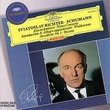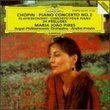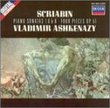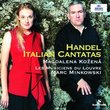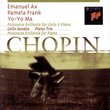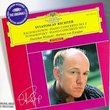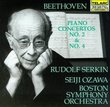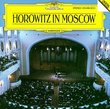| All Artists: Wolfgang Amadeus Mozart, Ferenc Fricsay, Bavarian State Opera Orchestra, Munich Bavarian State Orchestra, Berlin Philharmonic Orchestra, Clara Haskil Title: Mozart: Piano Concertos No 19 & 27 / Haskil, Fricsay Members Wishing: 0 Total Copies: 0 Label: Dg Imports Release Date: 7/1/1996 Album Type: Import Genre: Classical Styles: Forms & Genres, Concertos, Sonatas, Historical Periods, Classical (c.1770-1830), Modern, 20th, & 21st Century, Instruments, Keyboard Number of Discs: 1 SwapaCD Credits: 1 UPC: 028944972221 |
Search - Wolfgang Amadeus Mozart, Ferenc Fricsay, Bavarian State Opera Orchestra :: Mozart: Piano Concertos No 19 & 27 / Haskil, Fricsay
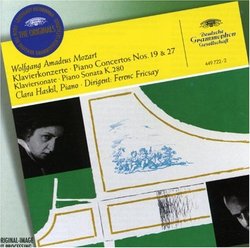 | Wolfgang Amadeus Mozart, Ferenc Fricsay, Bavarian State Opera Orchestra Mozart: Piano Concertos No 19 & 27 / Haskil, Fricsay Genre: Classical
Clara Haskil, who died in 1960, was a connoisseur's pianist. She specialized in the Classical era and rarely played showpieces. Her relatively few recordings are still treasured by collectors. These two Mozart Concerti, se... more » |
Larger Image |
CD DetailsSynopsis
Amazon.com Clara Haskil, who died in 1960, was a connoisseur's pianist. She specialized in the Classical era and rarely played showpieces. Her relatively few recordings are still treasured by collectors. These two Mozart Concerti, seconded by a fine conductor, are so subtly played they sound almost dull at first; they certainly aren't recommended to people who like their Mozart boisterous. Listened to with respect, the performances--and the music--gradually reveal their secrets. The Sonata, recorded in stereo, is beautifully performed and more vivid in sound. --Leslie Gerber Similar CDsSimilarly Requested CDs
|
CD ReviewsA real musical treasure! Hiram Gomez Pardo | Valencia, Venezuela | 03/07/2005 (5 out of 5 stars) " Clara Haskil was an extraordinary artist. She represents Mozart spirit per excellence. Her nuance, rapture and absolute domain of the Mozartian language is more than obvious when you listen very carefully every one of her different interpretations. In the case of the Concert No. 19 , a minor Concert in the universe of Mozart's Giants Piano Concertos, she extracts all the possible essence , giving to this Rhapsodic Concert the Operatic character so well accented in the last movement. But realize as she elevates this Andante to unimaginable levels. Despite the fact she played some Mozart piano Concertos with Markevitch, she established with Ferenc Fricsay an invisible and evident rapport you miss in Igor. Honesty, conviction and above all a profound devotion for Mozart is something you can not dissimulate , you have or not , but you never can mask behind the stage. In the case of this Concert 27, one of my eternal favorites Concerts by its wholeness , so well written, with such expressiveness, warmth and joy of living character is a real tramp for most of the interpreters. Mozart looks beyond its own time and seems to be thinking in another universe, light years ahead your colleagues. The First Movement is real jewel . full of that apparent sweetness surrounded of majesty, serene eloquence and perpetual mystery. The bars fall with the precise intonation, she emphasizes with such dynamism every note , her pianissimos, mezzo fortes and fortes are never out of place. She seemed to know so well the Mozartian spirit as such a few number of pianists in the story. Listen her cadenza played with rapture, delicacy and energy. When you listen to the Andante you are immediately carried to another level , it looks like exaggerate but try with her. The slender arpeggios and the brightness of her phrasing is simply overwhelming and admirable. Fricsay accompanies her with perfect results. The music breaths with such elegance and conviction without later effects. She drowns in these waters with that accuracy certainness, and purity that it results for you almost impossible not feeling it. When she makes the repeats of the first motive , she makes a slender rubato employing the pedal with velvet tenderness. Finally in the Third movement , Fricsay, Haskill and the whole orchestra display their best gifts. The invisible chemistry between all the members make of this so operatic introduction flows with discrete steps. They keep the austere atmosphere from the first bars, maintaining a slow tempo that progressively grows in intensity, never forced and the grace and humor never shades the hidden Ace of despair behind the apparent and radiant spirit of the principal theme announced by the piano. In the second theme the anguish empowers of the piano, the dialogue with the Orchestra keeps going and the piano gives the answer and the orchestra accompanies to this conclusion in which the short cadenza appears resuming both themes. Haskill attacks the melody and revitalizes the joyful motive with minor intensity than before, and the surprise appears when the piano and the Orchestra join again making an Imperial Farewell. The Sonata is magnificent played with that touch of class slenderness The adagio is simply outstanding. Her fingers create and recreate at the same time she plays. That is the real difference between Haskil and the rest of the interpreters. This a legendary and supreme recording that it's almost an imperative for you to have it. " Haskil's Mozart Shines Michael B. Richman | Portland, Maine USA | 10/19/2000 (5 out of 5 stars) "This is a wonderful CD of Mozart's piano music by Clara Haskil, with the Berlin Philharmonic under the direction of Ferenc Fricsay. Haskil tackles the 19th Concerto, one of Mozart's greatest, with glowing results, and Mozart's final 27th concerto is also captured beautifully, and in particular the mood of the finale. The recordings of the two piano concertos are both in mono, but they sound magnificent. The final piece, Piano Sonata K280, is a stereo recording from 1960, and it was Haskil's final session for DG. (She died six months later as a result of a fall at the Brussels-Midi railway station.) As the editorial review states, Clara Haskil may have been a connoisseur's pianist, but let me tell you, I'm no connoisseur (though I aspire to be) and I love this disc." Desert Island Mozart Michael B. Richman | 05/04/2003 (5 out of 5 stars) "This is an absolutely delightful recording, one that a listener wouldn't hesitate to take it with him or her to a desert-island. Clara Haskil, one of the handful of truly great artists of the 20th century, captures the spirit of the composer as no one else does. Moreover, in Fricsay, she finds a perfectly sympathetic partner completely in one with her in reaching to the heart of the music. More sublime music making than this is really difficult to imagine. Buy this disc and you will have a life-long companion that warms the heart and soothes the soul."
|

 Track Listings (9) - Disc #1
Track Listings (9) - Disc #1